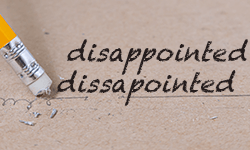
Many words in the English language are often misspelled by students. This can be due to differences in spelling in other languages or the fact that pronunciation doesn’t always match the spelling. A frequent spelling mistake occurs with the word “disappointed,” where it is often confused whether to write it with double “s” or double “p.” This article will cover everything you need to know about it.
Inhaltsverzeichnis
The correct spelling of “separate”
The word “disappointed” can function in different parts of speech, primarily as a verb and an adjective. It’s derived from the Old French word “desappointer,” composed of the negative prefix “des-” and “appointer,” meaning “to arrange” or “to appoint.”
Correct spelling
disappointed
Incorrect spelling
dissapointed
The only correct way of spelling the word is “disappointed” with a double “p.” The double “p” occurs because of the transition from the root word “appoint.” There is no double “s,” as the prefix “dis-” only has one, and the root “appoint” does not contain an “s.” Therefore, “disappointed” maintains these components, resulting in its correct spelling: D-I-S-A-P-P-O-I-N-T-E-D.
Mnemonic for spelling “disappointed”
Here are a few tips that may help remember the correct way of spelling “disappointed.”
Note:
- Think of “dis-” (prefix) + “appoint” (root word) + “ed” (suffix).
- Note the double “p” from “appoint” and single “s” from “dis-.”
FAQs
The only correct spelling is “disappointed” with a single “s” and double “p.”
Deriving from the Old French word “desappointer,” the word is spelled “disappointed,” composed with the prefix “dis-,” the root “appoint,” and the suffix “-ed.”
The noun of the adjective “disappointed” is “disappointment” and follows the same spelling conventions.
Printing Your Thesis With BachelorPrint
- High-quality bindings with customizable embossing
- 3D live preview to check your work before ordering
- Free express delivery
Configure your binding now!
